Key takeaways:
- Creative block is linked to emotional states, often stemming from fear and self-doubt, which can hinder an artist’s confidence and productivity.
- Collaboration and sharing experiences with others can provide fresh perspectives and alleviate feelings of isolation during creative blocks.
- Changing your environment and setting time constraints may spark creativity and help overcome the pressure of perfectionism.
- A supportive community and emotional understanding from friends or partners can significantly enhance motivation and creativity during challenging times.
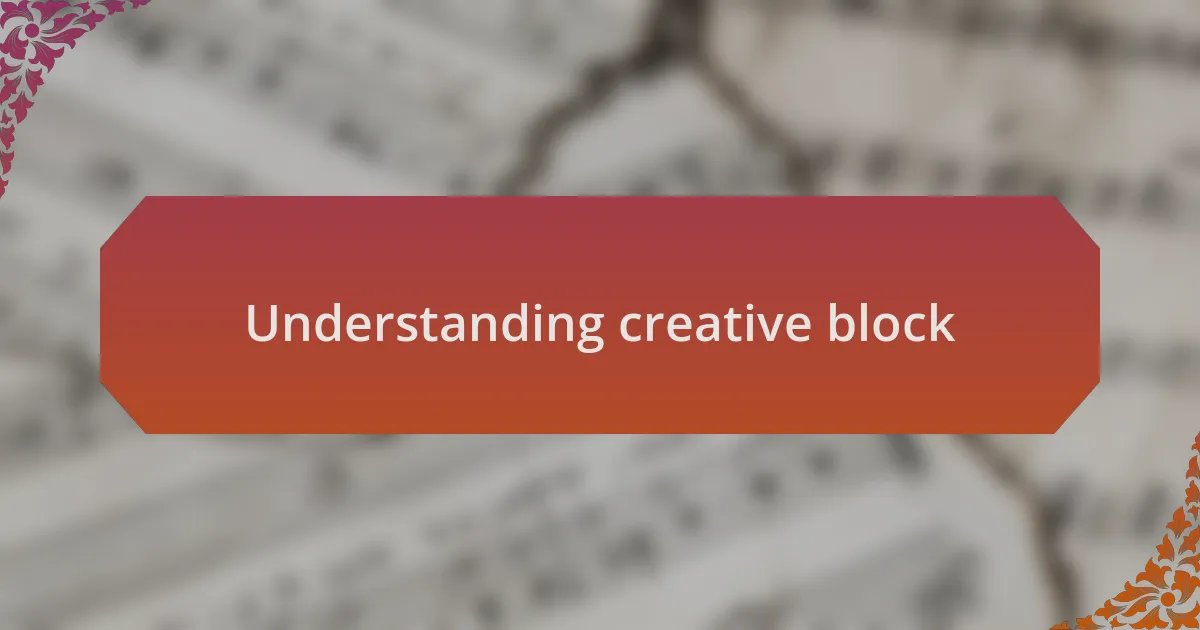
Understanding creative block
Creative block can be an overwhelming experience, often leaving you feeling trapped in your own thoughts. I remember a period when I sat in front of my instruments for hours, completely unable to produce anything meaningful. It felt as if a thick fog had settled over my creativity, making it hard to see any way forward.
What I’ve learned is that creative block isn’t just about the inability to create; it’s deeply tied to emotional states. Sometimes, it arises from fear—fear of failure or even fear of success. Have you ever felt that pressure to create something perfect, only to end up paralyzed? That pressure can stifle even the most seasoned artists, and acknowledging it is the first step toward breaking free.
Understanding the triggers behind creative block can be transformative. For me, it was about recognizing those moments of self-doubt and external pressures that stymied my ideas. I had to ask myself, “What am I truly afraid of?” This reflection helped me realize that the most profound obstacles often lie within, but they can also reveal new paths once confronted head-on.
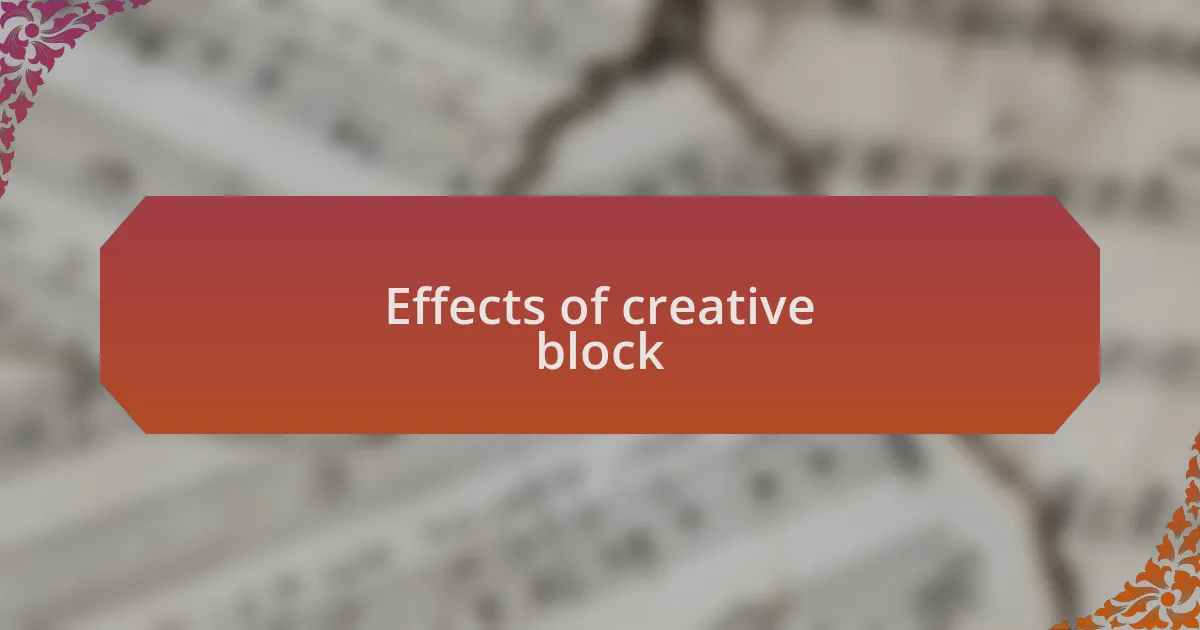
Effects of creative block
Creative block can have a heavy toll on an artist’s mental state. I distinctly remember a phase when my creative output came to a standstill, leading to feelings of inadequacy. The result? I found myself questioning my abilities, wondering if I’d ever create something worthwhile again. It’s astounding how much this internal struggle can sap your confidence and make you doubt your passion.
Not only does creative block stifle your ideas, but it can also impact your collaborations and relationships within the industry. During a time when I was stuck, I hesitated to share my frustrations with fellow musicians, fearing they’d view me as uninspired. I realized later just how isolating that experience can be; it’s as if you’re riding a wave, yet afraid to swim alongside others, worried that your own struggles could drag them down too.
Often, I found creative block serving as a cruel paradox. The more I tried to push through it, the further I felt from my goals. Have you ever felt that? It’s like standing at the edge of a cliff, wanting to leap into the creative abyss but being held back by the weight of your own expectations. This frustrating cycle taught me that embracing the block, rather than fighting it, can sometimes lead to surprising clarity and unforeseen inspiration.
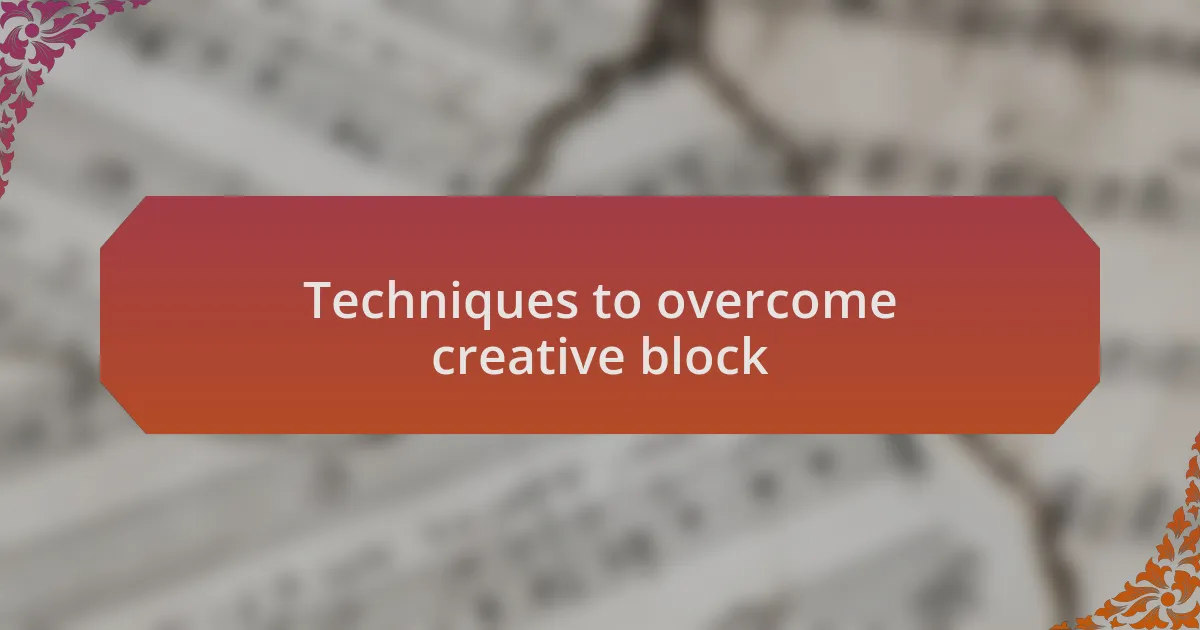
Techniques to overcome creative block
Finding the right environment can work wonders when tackling creative block. I remember once moving my workspace to a local coffee shop, where the vibrant atmosphere sparked new ideas. The simple act of changing my surroundings allowed me to absorb different sounds and conversations, igniting my creativity in ways I hadn’t expected.
Another technique that proved invaluable was setting strict time limits for my creative sessions. I would often challenge myself to write a complete song in just 30 minutes. This pressure transformed my approach; instead of getting lost in perfectionism, I found freedom in spontaneity. Have you ever experienced a rush like that? Sometimes, constraints can foster creativity rather than hinder it.
Moreover, I discovered the power of collaboration. When I was in a rut, teaming up with another artist brought fresh perspectives and energy. Sharing my thoughts aloud with someone else not only eased my isolation but also opened new avenues for creativity. How often do you talk through your block with a friend or collaborator? I realized that sometimes, a simple conversation is all it takes to shift your mindset and reignite your passion.
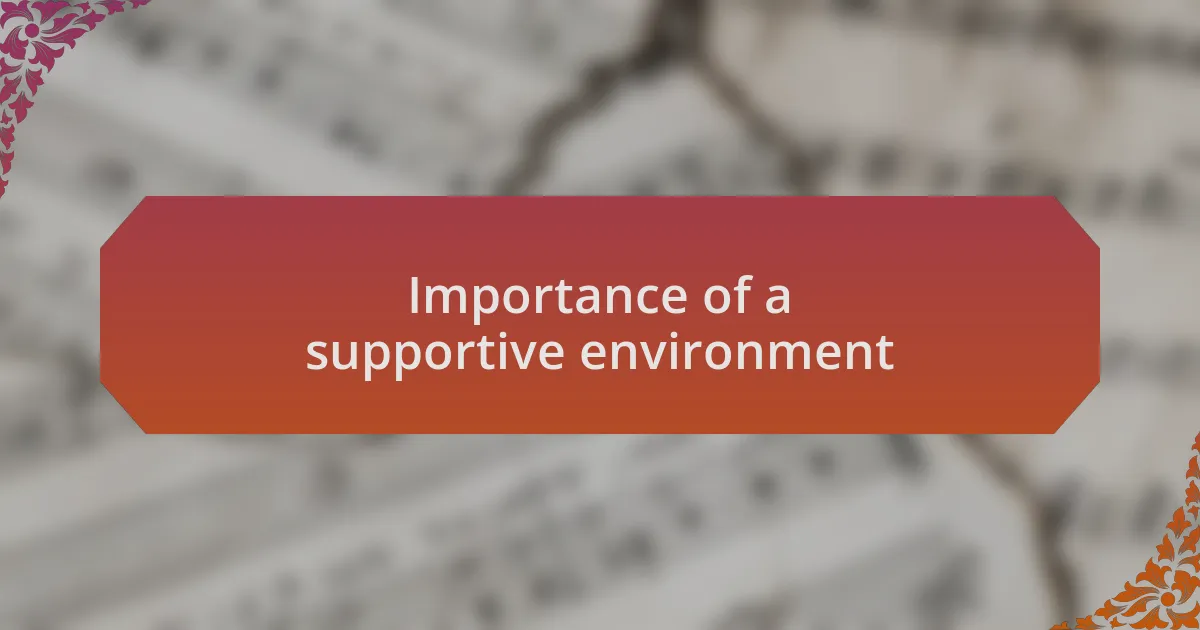
Importance of a supportive environment
Creating a supportive environment is crucial for overcoming creative block. I recall a time when I was struggling to finish an album, feeling overwhelmed and isolated. One evening, I invited a few artist friends over for a brainstorming session. The energy in the room was electrifying; their encouragement and positive feedback made me realize how collaboration could uplift our spirits and creativity alike.
I’ve also found that emotional support from those around me can change the creative game entirely. When I faced persistent writer’s block, my partner would often ask if I wanted to talk about what I was feeling or if I needed some space to think. This understanding created a comforting atmosphere that allowed me to voice my frustrations, leading to breakthroughs in my songwriting process. It made me wonder: how often do we underestimate the impact of simply being heard?
In my experience, having a supportive community or network can be the difference between stagnation and inspiration. I’ve seen firsthand that connecting with like-minded individuals opens doors to new ideas. When I’m surrounded by people who share my passion, it feels easier to take risks with my creativity. Isn’t it remarkable how a shared space can foster such growth? This camaraderie can spark a creative fire, making it easier to push through those blocks that once felt insurmountable.
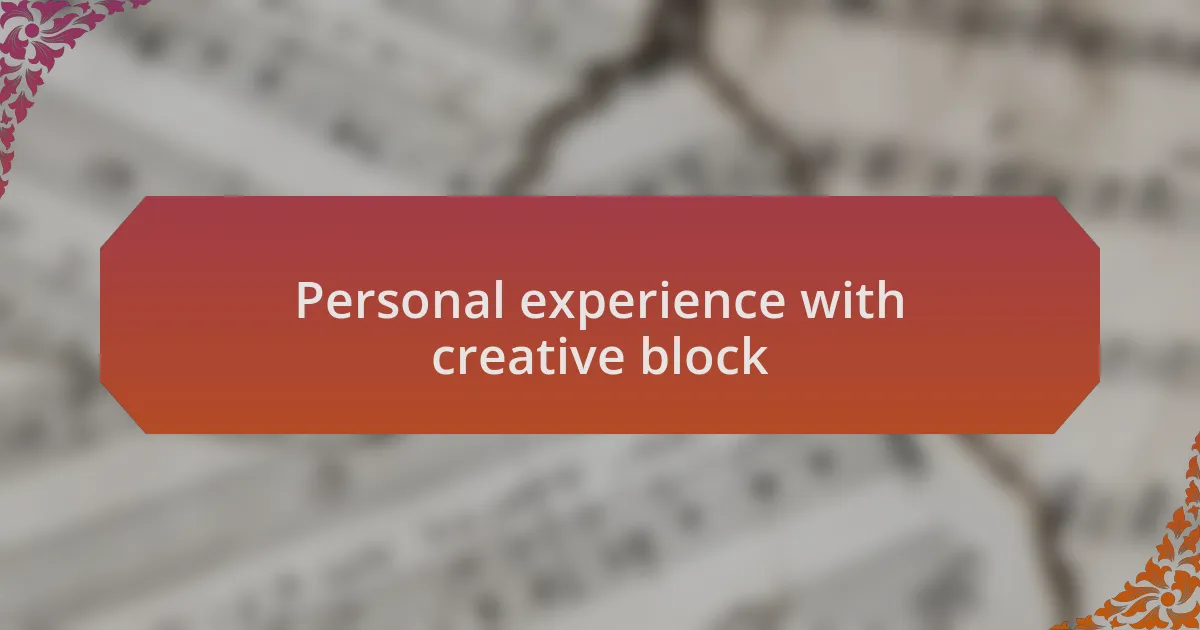
Personal experience with creative block
I recall a period when every attempt to write a new song felt like trudging through a thick fog. There was a point I’ll never forget: I tried to force creativity by locking myself away for hours, hoping that isolation would somehow spark inspiration. Instead, the silence only amplified my frustrations, making me feel even more trapped in a cycle of self-doubt. Ever felt that way?
One afternoon, I decided to step outside and take a walk—just a simple act that changed everything. I stumbled upon a local street artist painting a mural, completely absorbed in his work. Watching him lose himself in creativity sparked something in me. It reminded me that inspiration can come from the most unexpected places, sometimes requiring nothing more than a change of scenery.
There was a time when I thought I had to create in solitude to be authentic, but that couldn’t have been further from the truth. Sharing my struggles with fellow musicians revealed a common thread: we’ve all faced creative blocks at some point. It made me realize that vulnerability can be a powerful catalyst for creativity. If I opened up about my challenges, I often found others willing to share their stories too. Isn’t it fascinating how revealing our struggles can cultivate a deeper connection and inspire collaboration?